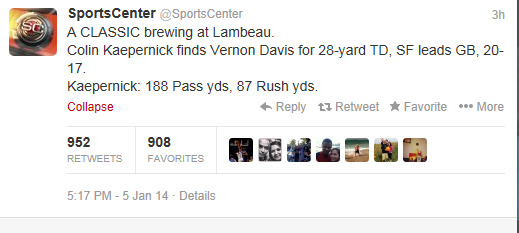I know many other people in the sporting world share this gripe with me but with a couple more instances of it occurring lately, I do feel the need to briefly touch on it. Sports media, sports fans, and athletes and coaches on a frequent basis prematurely and hastily christen games as “instant classics”. Emotion and social media contribute a lot to unrightfully labeling games as classics but also playing a role are people just not knowing in general what constitutes such a contest.
First and foremost, an instant classic is an extraordinary game. It is characterized by high stakes, numerous lead changes, unpredictable and outstanding plays, adversity, a solid storyline, special individual performances, a memorable environment, unusual occurrences, and passion. Very rarely does a sporting event contain every part of these criteria. I think this is where most people get tripped up when erroneously calling a sporting event a classic classic…they experience, watch, or play in a game that contains a couple of the items above, get emotional, and thinks that it is one for the ages.
An instant classic is not a close championship game. It is not a #23 ranked school beating a #1 ranked school. It is not a back-and-forth game that goes into overtime. It is not simply a buzzer beater or a last second field goal. It is not just a three touchdown comeback. While all of these games have components of a classic, they fall well short. A classic is not just a great game. A classic is not just a really great game.
This past week Texas A&M defeated Duke in the Chick-fil-A Bowl in thrilling fashion. The Aggies staged a comeback and the team’s star quarterback had a performance worthy of a top 10 NFL draft pick. Even with those things occurring, I feel Johnny Manziel misspoke when he called the game an instant classic in the postgame press conference. Although a very entertaining game, it was the Chick-fil-A Bowl. Texas A&M was supposed to win. At no time was the game seemingly out of reach. There have been actual BCS bowl games this season that were better than the Chick-fil-A Bowl and none of those by any means qualified as a classic.
Maybe this game was bound to get unrightfully dubbed as a classic because of all the lead up and talk about the weather beforehand, but today’s San Francisco 49ers vs. Green Bay Packers wild card playoff game was by no means one for the ages. However, you wouldn’t quite know that judging by social media. Leading the way was ESPN’S SportsCenter Twitter account (@Sportscenter) that midway through the fourth quarter tweeted out to its over 6.5 million followers that a “classic was brewing” with San Francisco leading 20-17. I saw similar tweets from many others exclaiming how it was a playoff game to be remembered forever. Really? The game ended just like many other NFL games end: a team (in this case the 49ers) receives the football with five minutes to go and stages a drive that allows them to milk the clock and kick a field goal with no time left. How is this a classic? And, just like with the Chick-fil-A Bowl, the team that was supposed to win ended up victorious.
I make a big deal out of this just because I think mislabeling a good game as a classic cheapens what a classic is. Putting the 2013 Chic-Fil-A Bowl on the same level as the 2007 Fiesta Bowl is wrong. Putting today’s Packers-49ers wild card game on the same level as Super Bowl XLII is blasphemy.
We get so engaged and emotionally invested in sports that sometimes it is easy to overhype it. In the same way, several times I have showered praise on an average steak at a restaurant or hailed a cheesy movie as Oscar worthy. I made these proclamations as I was midway through my meat after I hadn’t eaten all day and as the credits rolled as I was still wiping away tears from the ending. My point? Sometimes we just need to step back and let out emotions and intensity die down before evaluating the lasting value of a game, food dish, or movie. It takes a lot for a sporting event to become a classic, let’s keep those standards high. Don’t Blink.

